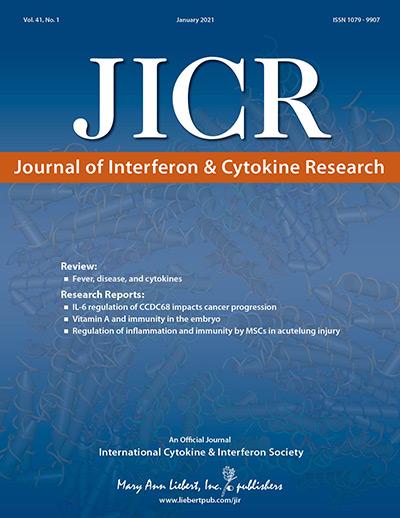
Credit: Mary Ann Liebert, Inc., publishers
New Rochelle, NY, January 20, 2020–SARS-CoV-2, the virus that causes COVID-19, blocks the processes of innate immune activation that normally direct the production and/or signaling of type I interferon (IFN-I) by the infected cell and tissues. IFN-I is a key component of host innate immunity that is responsible for eliminating the virus at the early stage of infection, as summarized in a recent review article in Journal of Interferon & Cytokine Research (JICR). By suppressing innate immunity, the virus replicates and spreads in the body unchecked, leading to the disease known as COVID-19. Click here to read the article now.
“SARS-CoV-2 utilizes various approaches to evade host IFN-I response, including suppression of IFN-I production and IFN-I signaling,” state Hongjie Xia and Pei-Yong Shi, University of Texas Medical Branch at Galveston. “Viruses defective in antagonizing IFN-I response, in combination with replication-defective mutations, could potentially be developed as live attenuated vaccine candidates.”
“Targeting innate immunity is highly attractive for therapeutic and vaccine strategies aimed at controlling SARS-CoV-2 infection and protecting against COVID-19. By revealing how the virus blocks innate immune programs we can then build approaches to restore these processes and enhance antiviral immunity,” says Journal of Interferon & Cytokine Research Editor-in-Chief Michael Gale Jr., Department of Immunology and Center for Innate Immunity and Immune Disease, University of Washington.
Other COVID-related articles in this issue of Journal of Interferon & Cytokine Research include a review by Benjamin Liu and Harry Hill on the role of host immune and inflammatory responses in COVID-19 cases with underlying primary immunodeficiency. Primary immunodeficiency patients are highly vulnerable to virus infections including SARS-CoV-2. The authors conclude that routine intravenous immunoglobulin therapy may provide some protective effects to patients with primary immunodeficiency.
Ricardo Pereda and coauthors explore the therapeutic effectiveness of interferon alpha 2b treatment for COVID-19 patient recovery. They showed that interferon treatment decreases the likelihood of intensive care stay and increases patient survival after severe or critical disease.
###
About the Journal
Journal of Interferon & Cytokine Research led by Editor-in-Chief Michael Gale Jr., Department of Immunology, University of Washington, Center for Innate Immunity and Immune Disease, is an authoritative peer-reviewed journal published monthly online with open access options and in print that covers all aspects of interferons and cytokines from basic science to clinical applications. Journal of Interferon & Cytokine Research is an official journal of the International Cytokine & Interferon Society. Complete tables of content and a sample issue may be viewed on the Journal of Interferon & Cytokine Research website.
About the Publisher
Mary Ann Liebert, Inc., publishers is known for establishing authoritative peer-reviewed journals in many promising areas of science and biomedical research. Its biotechnology trade magazine, GEN (Genetic Engineering & Biotechnology News), was the first in its field and is today the industry’s most widely read publication worldwide. A complete list of the firm’s 90 journals, books, and newsmagazines is available on the Mary Ann Liebert, Inc., publishers website.
Media Contact
Kathryn Ryan
[email protected]
Original Source
https:/
Related Journal Article
http://dx.




